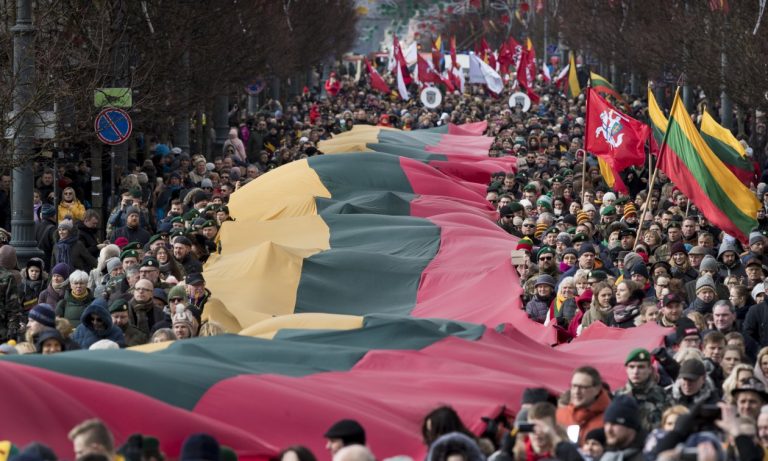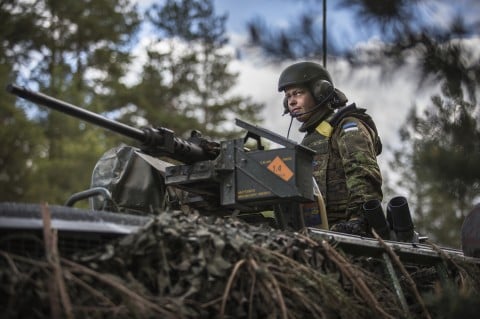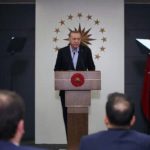This is the second in a series of three essays exploring the current strained relationship between Russia and the Baltic nations
The relationship between Lithuania and Russia goes back hundreds of years to the time when Lithuania was an empire. At its peak, that empire controlled much of eastern Europe, including all of the Baltics and stretching south to Ukraine and west to the Smolensk Oblast in western Russia. From 1295 until 1385, the Grand Duchy of Lithuania ruled as a stand-alone empire. After 1385, Lithuania slowly joined forces with Poland, and from 1569 until 1791 formally ruled together as the Polish-Lithuanian Commonwealth. It is easy to envision how an aggressive and paranoid nation like Russia that has such a long collective memory would feel the need to seek revenge on a smaller, but stronger state that had previously ruled Russia, off and on, for almost 500 years. That is perhaps, just how the current regime in Moscow feels about modern day Lithuania, and Lithuanians are very aware of this feeling. Will the post-Covid-19 world give the Kremlin the opportunity and motivation to fulfill its dream of reestablishing a Baltic buffer against NATO?

Several recent events may give credence to concerns by Lithuania of future hostile actions against its sovereignty by Russia. According to The Moscow Times, “Last summer, the Navy conducted its second annual “Ocean Shield” naval exercises in the Baltic Sea with more than 10,500 troops and dozens of warships. Defense Minister Sergei Shoigu vowed in 2018 to hold these military maneuvers on a regular basis.” These exercises are held ostensibly to prepare Russia for any aggressive acts by NATO along its northwestern border with the Baltic states. However, NATO was founded and still exists today, solely to act as a deterrent to any Russian aggression against a NATO member nation, and has never acted in anything approaching an aggressive manner towards Russia. Thus, the Kremlin’s rationalization for holding these large-scale military maneuvers is baseless. Furthermore, by stating that the maneuvers will be held on a regular basis in the future, Moscow is clearly signaling its capability and even its eagerness to attack the Baltics in overwhelming numbers.
In addition, just last week Russian Navy commander-in-chief Nikolai Yevmenov announced the purchase of six additional state of the art destroyers for its Baltic Fleet. “All six of the Karakurt-class corvettes from Project 22800 will be armed with Kalibr cruise missiles, Yevmenov said in a telegram to sailors marking Baltic Fleet Day that was published on the Defense Ministry’s website. Four of the vessels will also be equipped with Pantsir-M anti-aircraft systems.” Such modernization, increasing strength levels, and boasts of increased military activity in the Baltic region by Moscow cannot help but gain the undivided attention of Lithuania’s military and intelligence agencies. For an area with a combined population of just under six million, the three Baltic nations sure get a lot of attention and military budget consideration from the Kremlin. Why is that?
For an answer to that question, one must consider the national psyche that is the motivating force behind much of what drives Russian foreign policy. The Russian people, as are people of all nations, creatures molded by their history. In the case of Russia, that history includes several invasions by foreign powers over the course of hundreds of years, the most recent and perhaps the most devastating being the Nazi invasion in 1941. The scars of that invasion and brutal occupation still inform the psychology, attitude, and even the world view of virtually every Russian citizen, and the Russian government. The fear of an attack, invasion, and occupation of the motherland are never far from the subconscious of most Russians, even if they cannot immediately articulate that fear. That fear is so strong that it often manifests as paranoia, a deeply held belief that Russia is alone in a world of enemies, each committed to the destruction of Mother Russia, and all of them constantly searching for a weakness so they can launch the inevitable attack. Therefore, Russia must constantly project a strong military to the world, never show weakness, immediately take advantage of strategic opportunities when they arise, and always be vigilant.
A succession of Soviet, and then later, Russian governments have feed into this national paranoia to advance their own agendas. To state it simply from the Russian perspective: the rest of the world is always conspiring to attack Russia, so their only choice is to maintain, constantly upgrade and expand a strong military machine to defend against these foreign threats. That same sentiment has been used successfully for many decades to pour vast amounts of money into the Soviet/Russian military when the rest of the national budget, including basic quality of life items, went underfunded, or not funded at all. The Russian people have long made a bargain with the devil, the devil being the Russian government. That bargain calls for the Russian people to accept:
- a lifetime of abject poverty; a rapidly crumbling Soviet-era infrastructure; unmatched systemic corruption at every level;
- a despotic, unaccountable government;
- incompetent and untrustworthy law enforcement;
- human rights abuses on an unparalleled scale, and much more.
- In exchange for accepting a lifetime of misery and hopelessness, they allow the Kremlin to funnel a disproportionately large percentage of their gross national product (GNP) into the military with the understanding that the military will protect them from the rest of the world that are always massing their armies at the borders to attack Mother Russia. And for the most part, the Kremlin and the average Russia are just fine with that arrangement.
To further complicate matters, President Putin recently voiced his opinion on the distinctive nature of the Russian people and culture. “Russia is not just a country, it’s really a separate civilization”, stated Putin. He went on to say that the Russian culture must be protected through genetics and other advanced technologies. Part of that protection is to thwart entities such as NATO from setting up a forward base of operations on Russia’s borders from which to launch the inevitable invasion into Russia; inevitable, according to the accepted beliefs of both the Kremlin and the Russian people as a whole, especially those over 30.
Are the Baltics and Lithuania in particular being overly paranoid themselves over a possible Russian invasion? I believe that answer is a definitive, no. An article in The Washington Post illustrates why:
“Many in the Baltic states (Lithuania, Latvia, and Estonia) feel that they would be next to fall prey to Russia’s territorial ambitions, which it demonstrated by annexing Crimea in 2014. Russia has sent a clear message that it believes a war with U.S.-led NATO is within the realm of possibility. Russian soldiers awoke on March 16, 2015, to snap exercises that grew to encompass 80,000 service members — a number so large that it could only have been practice for such an event.”
Another recent article from by Tom McTeague in The Atlantic seemed to confirm that fear. “The nature of Putin’s leadership is that he can’t stand still; he has to keep pushing forward. This makes him more volatile. What happens if the Russian leader, spooked by the country’s collapsing economy, eyes an opportunity to test NATO’s resolve”? In addition, the Covid-19 pandemic together with the collapse of the international oil market may cause Putin to become more aggressive, not less, as many analysts had predicted. With the pandemic causing huge economic losses at home as well as a public health care system stretched to the breaking point, outside adventures may be a good way of diverting domestic attention away from the many internal problems Putin is powerless or uninterested in solving right now, and instead causing the people to rally around their strong, decisive president.
According to a recent story in the Financial Times, “Georgia’s president has warned that Russia’s struggle to contain the spread of coronavirus and an economic crisis compounded by an oil price collapse risks triggering new Kremlin aggression beyond its borders. History suggested internal problems in Russia tended to drive external belligerence rather than efforts to “revisit relations with its neighbors in a more co-operative manner.” All of these articles seem to confirm the fears voiced by Lithuania regarding a possible aggressive act by Moscow in the near future.
When I was in Vilnius a few years ago, I spoke with a middle-aged Lithuanian woman about the Soviet occupation and eventual Lithuanian independence. Now a successful banker, she recounted an incident in January of 1991 near the end of the Soviet occupation when Lithuania was struggling to become an independent nation once again. She was a university student at the time and had gathered near the television tower in the center of Vilnius along with hundreds of other students. They were there to stand together in solidarity and announce their independence from decades of occupation by the Soviet Union.
Several hundred students, her among them, linked arms and formed a large circle under the TV tower. Then they began to sing the Lithuanian national anthem. Suddenly, out of the dark of night, several military trucks loaded with Soviet troops pulled up and surrounded the students. The troops dismounted and formed a cordon around the students with their rifles leveled inward at the young Lithuanians. She and her friends were frightened, but they continued to link arms and sing. She then heard someone shout something in Russian, and suddenly the troops opened fire with their AK-47 rifles. The students tried to flee but many were cut down by the hail of bullets. When the shooting stopped, more than twenty-five students lie dead or dying. Her best friend bled to death in her arms. Within days of this massacre, the last Soviet troops withdrew from Lithuania and her nation was once again free. Through tears, this gentle woman, a banker from Vilnius, assured me that the cold January night under the TV tower that began with such joy, the mass murder of her friends that same night, and the many years of Soviet occupation prior to that night will never be forgotten.

Therefore, is it so difficult to understand why the government and people of Lithuania do not trust Moscow and genuinely fear another Russian invasion during the long and difficult post-pandemic period? I certainly have no difficulty understanding that whatsoever.
Author
-

Retired U.S. Army Counterintelligence Special Agent. He served in Iraq as a team leader of a tactical Human Intelligence Team (THT). Prior to his deployment to Iraq, David was an instructor at the reserve U.S. Army Counterintelligence Special Agent course. He has published four novels for Grand Central Publishing and is currently finishing a memoir of his experience in Iraq. David has also written articles for Vanity Fair, Salon.com, The American Prospect and The Washington Monthly.
View all posts





